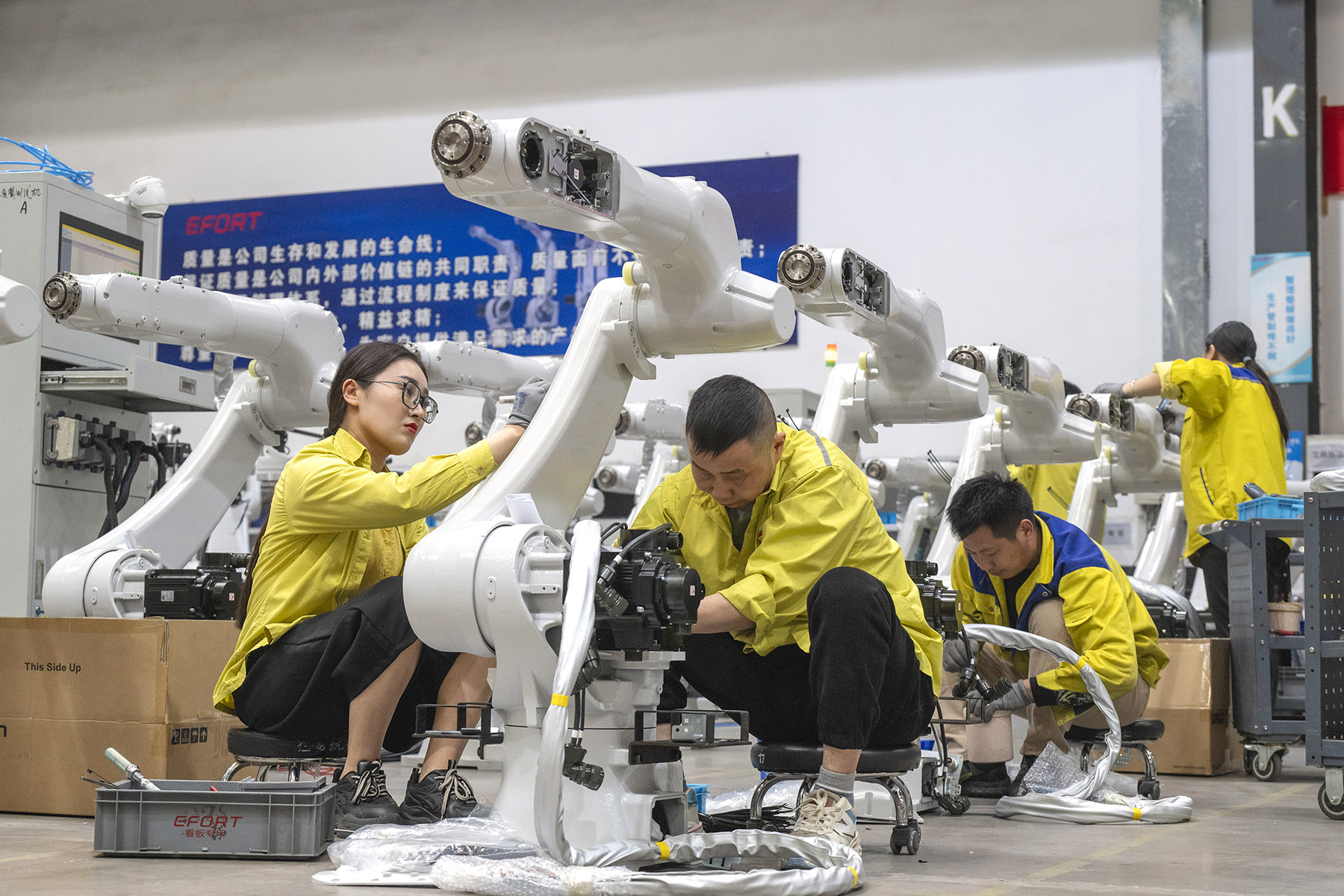Nation holds distinct advantage when it comes to intelligent iteration

In a brightly lit factory in Wuhu, East China's Anhui province, robotic arms whirl in perfect arcs, autonomous vehicles glide along guided paths like clockwork, and rows of gleaming industrial robots await final testing.
It is not just an advanced robotics factory but a future of China's robotics industry, as countries globally all bet big on robotics for future innovative development.
Zhang Wei, vice-president of Efort, a leading industrial robotics company and developer of the factory, said: "We've achieved full localization of all core components. The motion control algorithms in our robot controllers are now 100 percent independently developed."
READ MORE: Sci-tech sector maturing rapidly amid incentives
Founded in 2007 and listed on the STAR Market in 2020, Efort has grown from a regional startup into a national champion and is now designated as a little giant firm and a key supplier in the country's robot supply chain.
According to Zhang, working with domestic partners, Efort has developed core parts including servo motors, reducers and controllers, replacing once-dominant foreign imports.
"Even intricate components like magnetic steel sheets and brake encoders have been domestically sourced and integrated," he added.
The company's breakthroughs mirror broader progress. China now produces over half the industrial robots it consumes, a sharp rise from less than 10 percent just years ago.
Annual demand remains robust at 200,000 to 300,000 units, suggesting that domestic firms are no longer merely catching up, they're running neck-and-neck with global incumbents.
Nowhere is this more evident than in Efort's flagship welding robot. Outfitted with an advanced vision system, it can detect the thickness of irregular steel plates and perform precision arc welding on ship-grade materials.
Zhang recalled: "Ten years ago, our robots could only do basic loading tasks, but today, they can weld complex automotive frames and lead in intelligent applications."
On a broader perspective, Anhui province has emerged as a rising robotics hub. In just over a decade, the province's robotics industry has grown from a dozen companies to more than 500, with annual output topping 60 billion yuan ($8.37 billion) and production exceeding 30,000 units.
Wuhu, where the company is located, now ranks sixth nationwide among Chinese cities for industrial robotics.
Efort's innovation is also reshaping niche industrial processes. In solar energy, its high-precision wafer insertion robots are tasked with delicately placing ultrathin silicon wafers into graphite boats during photovoltaic cell production.
The wafers are so fragile that even the slightest vibration could shatter them. Efort's robots must handle over 8,000 wafers an hour with a scratch rate under 0.04 percent.
"It's like performing surgery on a moving target," Zhang said.
To meet such challenges, Efort developed a proprietary software process package that simplifies the calibration of hundreds of robot movements into a drag-and-drop interface. Engineers can now teach robots in 60 percent less time, reducing costs and enabling faster mass deployment.
The company's ambitions don't stop at the factory floor. Efort has established R&D centers, national-level engineering platforms and a postdoctoral research station. It has also co-founded an industrial robot training base with local universities, supplying local industry with job-ready talent.
ALSO READ: Wujiang's innovation ecosystem evolving rapidly
Just next door, at another Wuhu-based firm called CowaRobot, a fleet of white sanitation robots cleans roads autonomously, guided by the same AI principles underpinning Efort's systems. A suitcase that follows its owner using facial recognition — another CowaRobot product — embodies the crossover potential of China's smart robotics.
"China holds a distinct advantage when it comes to intelligent iteration. Globally, the development of smart technologies is progressing at a similar pace, but when it comes to rapid deployment and large-scale application, China often leads the way," said Lu Wenjun, deputy general manager of CowaRobot.
"While foreign countries may have had a head start in original technological breakthroughs, once we've completed benchmarking and learning, Chinese companies are never slow in catching up," Lu added.
Contact the writers at chengyu@chinadaily.com.cn


